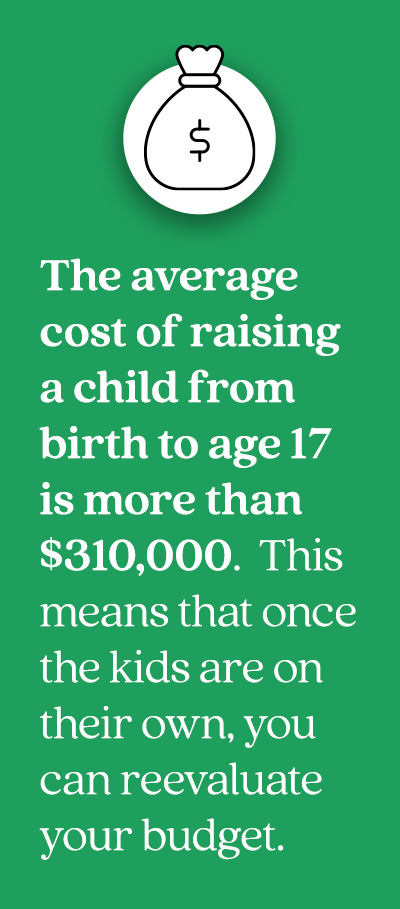4 Financial Opportunities for Empty Nesters
With the kids out of the house, finances are in focus. Now’s the time to make retirement savings the priority.
 iStock
iStock
Your children have grown up and moved out—and now you’re free to reclaim your future. As an empty nester, you have a great opportunity to focus on making sure you’re on a strong path to retirement. Here are four financial opportunities to consider once the kids move out.
No.1: Review your finances and reprioritize your goals.
The estimated average cost of raising a child from birth to age 17 is more than $310,000. This means that once the kids are on their own, you can reevaluate your budget to assess how much you’re spending (or not spending) now, identify areas where you can cut back or spend more, and reallocate funds to new priorities.
Where will your freed-up funds go? Some logical choices include:
- Bulking up your retirement savings.
- Paying down credit card debt.
- Purchasing a second property or investment property.
- Contributing to an emergency fund.

 iStock
iStock
No.2: Rightsize the right way.
Housing is the greatest expense of raising a child. Rather than staying in a home that’s too big for you—and spending money heating and cooling rooms you won’t use—you could downsize to a smaller place.
A lower house payment and cheaper utilities, along with less-expensive maintenance and lower property taxes, can increase the amount of money you can put away for your future.
There are four compelling reasons to consider an annuity for retirement planning.
Read More >> iStock
iStock
No.3: Grow your retirement savings as much as possible.
The financial demands of raising children—everything from piano lessons to college funds—may have kept you from contributing as much as you’d have liked to your retirement account. But now that you have an empty nest, it’s a smart time to ramp up your retirement savings.
Experts recommend saving 10% to 15% of pretax dollars every year for retirement. As of 2023, employees can contribute a total of up to $22,500 annually to their 401(k) plans, both Roth and traditional. If you’re over 50 years old, you can contribute a total of up to $30,000 annually.
A retirement calculator can be a helpful tool in determining how much you can plan on having, based on your age, contribution amount and expected rate of return.
 iStock
iStock
No.4: Analyze your insurance needs and adjust accordingly.
Review your insurance and look for places to save while still ensuring that your coverage takes care of your needs.
And, once you’ve determined what your retirement savings needs are, consider adding a financial tool to help you reach them. Life insurance is one such option that can help meet your goals for savings, paying off debt and more.
Insurance underwritten by one of the following companies: Auto Club Insurance Association, MemberSelect Insurance Company, Auto Club Group Insurance Company, Auto Club Property-Casualty Insurance Company, Auto Club South Insurance Company, Auto Club Insurance Company of Florida, or non-affiliated insurance companies.
AAA Life and its agents do not provide legal, tax or financial advice. Please consult your professional advisor prior to the purchase of any policy or contract. AAA Life Insurance Company is licensed in all states except NY. Life insurance underwritten by our affiliate, AAA Life Insurance Company, Livonia, MI. Products and features may vary by state. Policy Form Series: ICC10-5501WL/5501WL; The California Certificate of Authority number is 07861. CA is Digital Only. ALMI-25114-918-XX
Products are offered by Auto Club Trust, FSB, Equal Credit Opportunity Lender.